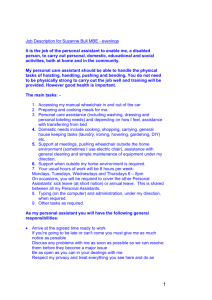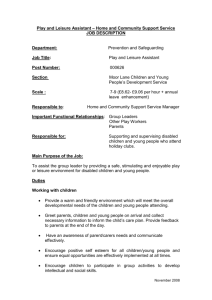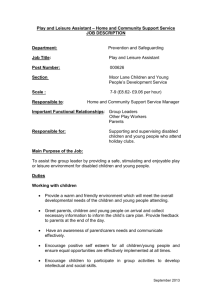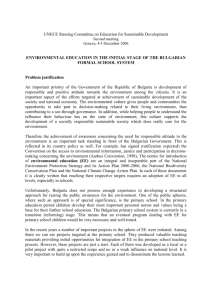A summary - ENIL – European Network on Independent Living
advertisement
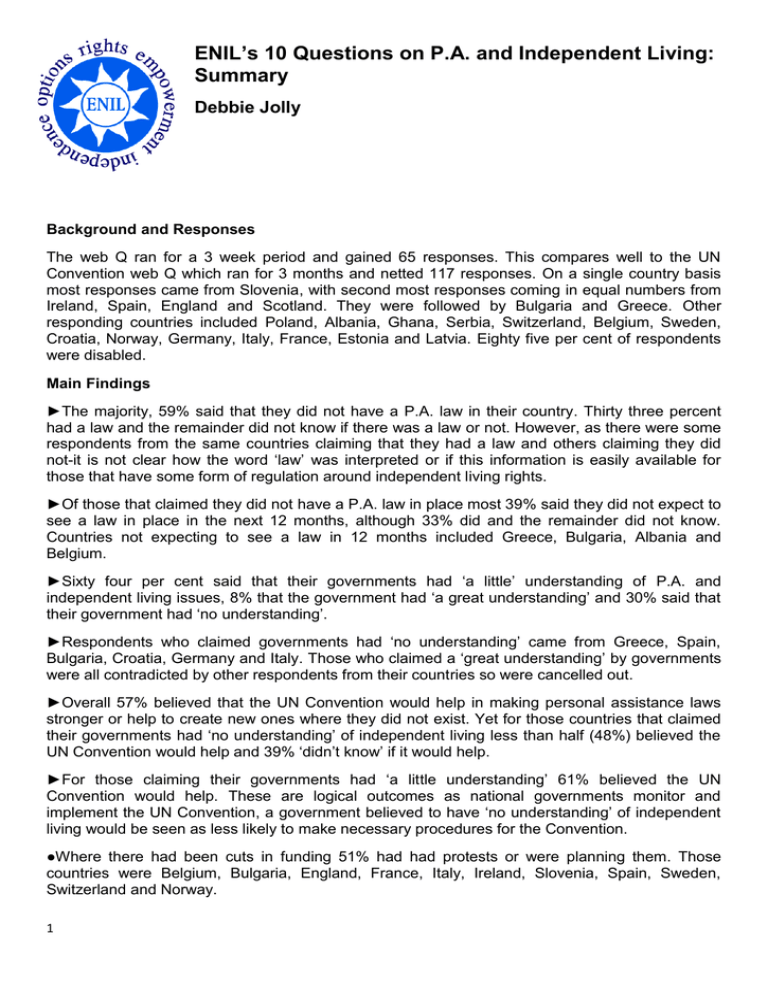
ENIL’s 10 Questions on P.A. and Independent Living: Summary Debbie Jolly Background and Responses The web Q ran for a 3 week period and gained 65 responses. This compares well to the UN Convention web Q which ran for 3 months and netted 117 responses. On a single country basis most responses came from Slovenia, with second most responses coming in equal numbers from Ireland, Spain, England and Scotland. They were followed by Bulgaria and Greece. Other responding countries included Poland, Albania, Ghana, Serbia, Switzerland, Belgium, Sweden, Croatia, Norway, Germany, Italy, France, Estonia and Latvia. Eighty five per cent of respondents were disabled. Main Findings ►The majority, 59% said that they did not have a P.A. law in their country. Thirty three percent had a law and the remainder did not know if there was a law or not. However, as there were some respondents from the same countries claiming that they had a law and others claiming they did not-it is not clear how the word ‘law’ was interpreted or if this information is easily available for those that have some form of regulation around independent living rights. ►Of those that claimed they did not have a P.A. law in place most 39% said they did not expect to see a law in place in the next 12 months, although 33% did and the remainder did not know. Countries not expecting to see a law in 12 months included Greece, Bulgaria, Albania and Belgium. ►Sixty four per cent said that their governments had ‘a little’ understanding of P.A. and independent living issues, 8% that the government had ‘a great understanding’ and 30% said that their government had ‘no understanding’. ►Respondents who claimed governments had ‘no understanding’ came from Greece, Spain, Bulgaria, Croatia, Germany and Italy. Those who claimed a ‘great understanding’ by governments were all contradicted by other respondents from their countries so were cancelled out. ►Overall 57% believed that the UN Convention would help in making personal assistance laws stronger or help to create new ones where they did not exist. Yet for those countries that claimed their governments had ‘no understanding’ of independent living less than half (48%) believed the UN Convention would help and 39% ‘didn’t know’ if it would help. ►For those claiming their governments had ‘a little understanding’ 61% believed the UN Convention would help. These are logical outcomes as national governments monitor and implement the UN Convention, a government believed to have ‘no understanding’ of independent living would be seen as less likely to make necessary procedures for the Convention. ●Where there had been cuts in funding 51% had had protests or were planning them. Those countries were Belgium, Bulgaria, England, France, Italy, Ireland, Slovenia, Spain, Sweden, Switzerland and Norway. 1 The remainder of the document looks at the things people wrote in response to the ‘open ended’ questions. Have there been any changes to Personal Assistance or Independent Living Rights in your country in the past 12 months? Many countries had experienced changes some were positive: “We have the law for personal assistance coming in next year” (Slovenia) “New law, hopefully, in autumn to make self-directed support (PAS etc) the default position in community care provision. People will have to say why they cannot have PAS, rather than pleading for one” (Scotland) “Made project for assistants for people with visual impairments” (Latvia) “Draft of new Law on Social Security explicitly provides for personal assistance, which is step forward since existing law merely prescribes for allowance for assistance of other person and the anti- discrimination law calls upon local authorities to promote support services” (Serbia) Others were not so positive were mainly to do with ‘cuts’ and economic excuses, always something put forward to prevent good P.A. systems and now something put forward to cut and undermine the systems in place too: “Services cut Campaign for legislation specific to PA Campaign for legislation for Direct Payments - agreed with minister and in process with govt at present” (Ireland) “Yes. Although we have new personal assistance laws, they have not been implemented correctly” (Spain) “We have the assistance but we don't have enough people to employ because we don't have enough money for the salaries” (Slovenia) “Cuts are imminent and criteria for getting direct payments are changing”.(England) “Yes, a narrower interpretation to whom shall access personal assistance schemes” (Sweden) “Yes big cuts in funds to independent living, closure of main Independent Living Funds, attacks on all [disability] benefits and an expected increase in charges for those who do receive PA through the local authority systems” (England) “[T]he dependency law included some personal assistant but for only for few people and giving them very little money. UN convention would help if it wasn’t just a paper, but of course Spain signed it first. When we say about reviewing the laws to change them according the UN convention, now we have another answer: we are in an economical crisis” (Spain) “Not yet, but due to cause the economic crisis it's possible in the next months” (Italy) “Yes lots of cuts in care provision e.g. in Warwickshire one third of people now getting free care for critical and substantial needs will lose this” (England) 2 One person mentioned private companies making money from schemes without knowledge of the social model and another the barriers in place which prevent the system working as it should for disabled peoples best outcomes. However, it is fair to say that neither of these issues are restricted to the countries stated but exist in all countries too. “Private companies is growing up and becomes more available, sadly, most of them based on medical thinking” (Norway) “In UK the whole approach to community care is changing and self-directed support is promoted by governments as the way forward. Local implementation and implications for local authorities are a big barrier to positive outcomes for a effective system” (Scotland) What do you think Disabled Peoples’ Organizations need to do to make Personal Assistance a legal right everywhere? Protest, activism and advocacy was the response from most: “More protest, more lobbying everyone accepts it [P.A.] needs to be in place but we get arguments of economic climate, too expensive ect It is more expensive not to provide PA and IL supports in the long run. I do not think Disabled Peoples’ Organisations are saying this loudly enough”. (England) “Massive civil actions need to be taken all over Europe, people with disabilities have to exchange their experience and to stand up more stronger and undoubtedly their right of PA”. (Bulgaria) “Argue, discuss, show examples, fight, STAND TOGETHER!” (Switzerland) “FIGHT FOR IT, BUT THIS IS DIFFICULT, BECAUSE GOVERNMENT IS NOT WILLING TO DO SOMETHING” (Greece) “More direct actions”. (Bulgaria) “More advocacy on PA as a social service, regulated as a legal profession and paid according to the salaries system, PA should be insured and the person with disability should have the right to choose the PA (a person or entity)” (Albania) “Sustainable advocacy” (Ghana) “Strong protests”. (Italy) “- facilitate activism; - focus on raising awareness and peer support/counseling; - strengthen the IL movement”. (Bulgaria) “Promote personal assistance as the only viable for disabled persons to live their lives independently. Raise public awareness for personal assistance to persuade politicians of the fact”. (Slovenia) “I have thought about that many many times, I have not idea. But now we have the Convention, go to the street in every single country the same day... and resist until we get it...but I am not even sure if that would work” (Spain), Create good models and spread information through good communications: 3 “To create independent living centers that follow the independent living principia of freedom to employ and use the personal assistance necessary to carry out our projects of life” (Spain) “Uveljaviti enotno zakonodajo po vzoru najboljših praks v svetu” (Slovenia) Enforce uniform rules along the lines of best practices in the world “Examine best practice internationally Identify the ideal model for their national context Develop a position paper outlining purpose, reasoning and benefit - in line with mainstreaming Involve people with disabilities in a campaign - lobby national government. Target senior civil servants”. (Ireland) “They should share the information about the opportunity to have a personal assistant. At the local government where I live, very few disabled people know about the opportunity to have that kind of help as personal assistant. After sharing the information I think that those disabled people who (will) use personal assistant would be more willing to want more from that”. (Estonia) “Ask the government via evident studies about the real situation /needs /wishes of disabled peoples and an "performance" test of existing laws. Found inhuman treatments against peoples who need adequate personal assistance and wish it. Bring founded cases direct to EU Human right justice or the EU- commissioner because this peoples most have no time for resource/ live quality killing (long) process at country intern courts”. (Germany) “communications” (France) “They [disabled peoples’ organizations] should change so that the so-called leaders care more about the members than themselves”. (Greece) Others said: “To push the government to make the PA law hang together with the UN Convention” (Spain) “Yes, there must be a law and a specific statue for P.A.. a law that permits us to make our assistant working at night and in the weekend cause we don't have that for the moment in Belgium. we all handle unlegal.................” (Belgium) “Our organization has consulted with the University. Together we will promote personal assistant educating adult students and by training interested”. (Poland) “Succeed in main streaming the issues, we need strong allies in all sections of society!” (Sweden) Additional comments Law makers and frameworks: “Sad but true is that the persons who make the law do not know what personal assistance really is”. (Slovenia) 4 “In UK where the right of PAs is in embedded in law and where the question is about how to promote it better the main problem is health and community care budgets being cut and threatening any support to disabled people. In any country promoting personal assistance as a right without also advocating for support to disabled people to manage it would be counterproductive and could potentially bring a negative outcome for disabled people. In UK this is a key area CIL's and other support organizations are currently advocating for”. (Scotland) Regional differences: “In Italy due to the regional federalism we have a different situation: in the north it's possible get money for the personal assistance with regional deliberation, on the centre very low and nothing on the south” (Italy) “There is a schism between central and local government. Central government is committed to the promotion of independent living (including PAS) but most local governments put up organizational barriers to its implementation and refuse to fund it properly”. (Scotland) “Many varieties between the different regions, overview difficult” (Switzerland) “Different models and different systems throughout the country, some places with no service at all. Mostly able bodied people running the services”. (Ireland) Problems with understanding by governments and effectiveness of P.A: “In Bulgaria the State has no understanding of PA at all. We have something like Personal assistants which support much more service providers and family members, holding up the dependency of people with disabilities rather than to support their independent living”. (Bulgaria) “Here changes go really slow, we still have people at home like in jail, with steps and family as compulsory carers or a nursing home, some with abuses that are hidden”. (Spain) “PwD are beneficiaries of the cash transfer scheme, which is a fixed monthly sum (indexed if wages level and pensions are raised up), the disability payment is given to every person commissioned by medical commission as having a disability. This commission states whether the person needs assistance and if yes, the person gets the same amount a money per month for the PA (80 Eur/month)” (Albania) “I feel that the health services are trying to go back to a medical model of PA service and not allowing a social model due to budget cuts we need to be fighting this”. (Ireland) “The maximum amount of money for personal assistance affords only for less than 4 hours a day of assistance. This maximum is reduced depending on user's rents and incomes”. (Spain) “There is still no PA in Latvia, only something like carer, but not a lot”. (Latvia) “There is a lot of misunderstanding around PA in Bulgaria - for instance Euro 1 per hour for up to 160 hours a month is called 'individual budget for personal assistant". Disabled 5 Bulgarians are controlled by their families, institutions and experts, and they do not respond properly to such imitations of modern mechanisms”. (Bulgaria) “it is not enough ! lots of people just have PA to subsist not to live a correct life” (France) Costs: “Slowly becomes stronger and easily to get it, but it has many problems with financial situation” (Slovenia) “Poland has introduced a profession-personal assistant. The government fears the financial cost of implementing the law on personal assistant. Urgently need a program of professional training in the profession of personal assistant” (Poland) “They (gov) know what we want but don’t want to pay for it” (England) “Our government always say WE DO NOT HAVE MONEY FOR PERSONAL ASSISTANCE but they spend a lot of money for wrong policies”. (Bulgaria) Future issues: “[I]t is the stated intention of the Irish Minister for disability to bring proposals on personal assistance and direct payments to Cabinet prior to Christmas 2010. Those proposals will be based on the report of a Policy Review Group which are due to make an interim report next month. CIL have met with the Chairman and members of the Policy Review Group to impress upon them the CIL policy position on personal assistance. Over the next 6 months CIL will be developing a detailed position paper on personal assistance”. (Ireland) “Provisions of existing laws on social security on allowance for other person's assistance and anti- discrimination law provide some legal basis for personal assistance in my country but it has to be explicitly mentioned in the new law. CIL Serbia has been introducing personal assistance service in Serbia over past decade, with support from foreign and international donors and limited funding from Serbian government and some local authorities”. (Serbia) “We need desperately a push, a "roadmap" or something, from abroad to assist the development of a grassroots movement, separately from the existing disability organizations, to promote and support IL implementation”. (Greece) “I think that protests are planned, not just to do with this but also cuts in benefits, etc.”(England) 6 Notes: The survey was carried out on line using Survey Monkey. Survey Monkey represents a program that is accessible for screen readers with the additional option to change background colours for those with visual impairments or some forms of dyslexia. All percentages stated are rounded percentages 7
